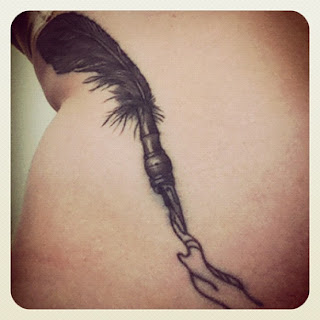Writing a book is a horrible, exhausting struggle, like a long bout of some painful illness. One
would never undertake such a thing if one were not driven on by some demon whom one can
neither resist nor understand. For all one knows that demon is simply the same instinct that
makes a baby squall for attention. And yet it is also true that one can write nothing readable
unless one constantly struggles to efface one's own personality. [...] And looking back through
my work, I see that it is invariably where I lacked a political purpose that I wrote lifeless books
and was betrayed into purple passages, sentences without meaning, decorative adjectives and
humbug generally.
* * *
I haven't posted because I've been working.
Making money: never. Words, yes. Plucking fibers from the air of a life that's unraveled and weaving them into pages.
I'm still working, now. Tirelessly. Last night, while I looped in and around the rungs of sleep, I edited words which I'd read at least 800 times already: silent, aloud, fractured, full. Hyperbolic? I think not.
This week I hope to wrap-it. Not the writing. But the crafting. The carving of my piece on the months spent wandering inside of the globe of a city called New York. 2009, maybe '10, the year we embarked. Hands dehydrated with clay yet awash with water just to skim a few layers here and add functionality there.
I need begin researching. My favorite memoirs. Their publishers. Styles. Tone. Syntax. Semantics. Story. Ticks. Resurfacing.
I'm not sure that mine fits: fiction-like, literature, far beyond the scope of schoolyard scribbles. Every time I write, I feel the pen & ink, weighted in my hand. But when I look down and read, thick and sloppy chalk slaughters the sagging lines of my page. Like assaulting cardboard with a box-cutter to slice intricate snowflakes into lace.
Truly, you will never know. Not the writing. But what it was like. God could maybe tell you, but, all writers, all I've ever known, have only ever tried.
 |
| (Shawn Booth. Kamikaze Tattoo.) |
* * *
George Orwell (Animal Farm, for one) famously penned the essay (1946) and the inspiration for this post. Here are my favorite excerpts. Worth reading because it's not just about the write.
(i) Sheer egoism. Desire to seem clever, to
be talked about, to be remembered after death, to get your own back on
the grown-ups who snubbed you in childhood, etc., etc. It is humbug to
pretend this is not a motive, and a strong one. Writers share this
characteristic with scientists, artists, politicians, lawyers, soldiers,
successful businessmen — in short, with the whole top crust of
humanity. The great mass of human beings are not acutely selfish. After
the age of about thirty they almost abandon the sense of being
individuals at all — and live chiefly for others, or are simply
smothered under drudgery. But there is also the minority of gifted,
willful people who are determined to live their own lives to the end,
and writers belong in this class. Serious writers, I should say, are on
the whole more vain and self-centered than journalists, though less
interested in money.
(ii) Aesthetic enthusiasm. Perception of
beauty in the external world, or, on the other hand, in words and their
right arrangement. Pleasure in the impact of one sound on another, in
the firmness of good prose or the rhythm of a good story. Desire to
share an experience which one feels is valuable and ought not to be
missed. The aesthetic motive is very feeble in a lot of writers, but
even a pamphleteer or writer of textbooks will have pet words and
phrases which appeal to him for non-utilitarian reasons; or he may feel
strongly about typography, width of margins, etc. Above the level of a
railway guide, no book is quite free from aesthetic considerations.
(iii) Historical impulse. Desire to see things as they are, to find out true facts and store them up for the use of posterity.
(iv) Political purpose. — Using the word
‘political’ in the widest possible sense. Desire to push the world in a
certain direction, to alter other peoples’ idea of the kind of society
that they should strive after. Once again, no book is genuinely free
from political bias. The opinion that art should have nothing to do with
politics is itself a political attitude."
* * *
(i) I like to think a lot about what I will say & how funny I'll sound when Ellen interviews me, SNL invites me as host, & Joel McHale begins to emulate me.
(ii) I read my words aloud. A lot. (Like right now.)
(iii) I want to fossilize the truth of what happened to me because its posterity could change meaning for possibly the world.
(iv) Health Insurance. Mental Health Care. Women's Rights. Education. Free.
* * *
here's to writing a book.
& then getting it
published.
(but mostly,
to writing a book.)
& Orwell, too.
![Validate my Atom 1.0 feed [Valid Atom 1.0]](valid-atom.png)
No comments:
Post a Comment
Not your typical BarbaraEllen ... but still be constructive. Creative also welcome! xo.